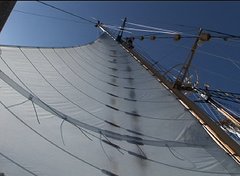Ahoy, readers! We continue our journey
through the South Pacific, and after a couple days of open ocean we are now
expecting landfall in the next 3 hours. It’s been almost a week since we
arrived in Rangiroa, and tomorrow morning we should be arriving at Caroline
Island (or Karoraina in iKiribati). As you have probably gathered by now, the
Mama Seamans is a very demanding ship and requires attentive hands at all hours
of the day. I am writing this having just come off mid-watch, a 4-hour watch
period between the hours of 11pm and 3am. It sounds brutal, and sometimes it
is, but for the most part our sleep schedules have adjusted to life on a ship.
You get your naps in whenever you can, so the actual time of watch ends up
having little importance.
As I was sitting on bow lookout during this
mid-watch, I was thinking about what I should write here. When you’re on
lookout you’re pretty isolated from everyone else on the ship, unless people
are handling sails near the bow. For the most part, people are either in the
lab or near the stern of the boat while working. When I’m on lookout I always
go through a cycle of thoughts in my head – it starts with “WOW” as I look
around and appreciate where I am, then I get to thinking about life, and
eventually I hit boredom when I realise I’ve run out of songs to sing to myself
and don’t actually know the full words to any. So on this fine night, as I
tried to entertain myself, I looked up at the night sky and was amazed. It was
the clearest night I’d seen yet, not a cloud in sight and a waning moon. The
stars were absolutely incredible and I saw more shooting stars then ever before
in my life.
We had been doing a lot of science stations
in the last couple of hours (more about our science deployments to come in
future posts, I’m sure), which means the boat was hove to (not moving). This
limits the responsibilities of the people on deck since we aren’t sailing
during stations, and so Scott, our watch officer and 2nd Mate, was
sharing his knowledge of the stars with us while we waited to get back underway.
I’ve always had a very difficult time discerning constellations and have thus
found astronomy to be very frustrating. But last night was like an epiphany – I
finally could see the horse in Centaurus, or the tail of Scorpio. Most
satisfying was the feeling when I went over to be lookout and as I looked up at
the sky I could find the stars and constellations Scott had taught me on my own.
I could find the big dipper, trace it up and arc to arcturus and then speed
over to Spica. I could find Vega, the star we had been using to navigate by
at night sometimes, and find the summer triangle she forms with two other
bright stars whose names escape me. Not only is it satisfying to understand and
recognize constellations, but also many of these are navigational stars and
will come in handy when we start shooting them with sextants to obtain our
geographic position (known as celestial navigation). It was a great feeling to
look up and see an uninterrupted sky, horizon to horizon, filled with stars and
planets, and appreciate the natural beauty of our universe. The most amazing
things occur naturally, and on this voyage with just our patch of sea for
company, I am really beginning to grasp how amazing Earth’s natural wonders
are. Hopefully my astronomical knowledge will continue to grow in the next few
weeks as the Seamans brings us across many more night skies!
-Isabella Badia-Bellinger


3 comments:
must be something to see all those constellations in the sky!
Can't wait for you to teach me a few constellations... sounds amazing!
How amazing to be able to see and then navigate the night sky. Must be wonderful.
Post a Comment